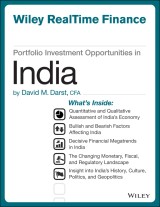Details

Portfolio Investment Opportunities in India
Wiley RealTime Finance 1. Aufl.
|
38,99 € |
|
| Verlag: | Wiley |
| Format: | |
| Veröffentl.: | 14.11.2013 |
| ISBN/EAN: | 9781118824146 |
| Sprache: | englisch |
| Anzahl Seiten: | 168 |
DRM-geschütztes eBook, Sie benötigen z.B. Adobe Digital Editions und eine Adobe ID zum Lesen.
Beschreibungen
<b>Investment strategies and knowledge for asset managers investing in India</b> <p>This e-book only investment report will detail India's asset classes, its investment strategies, risks and advantages, and politics and cultural history with an eye toward serving investment advisors and asset managers looking for up-to-date investment knowledge on specific alternative asset classes.</p>
<p><b>About the Author ix</b></p> <p><b>Introduction xi</b></p> <p><b>Section 1: India at a Glance 1</b></p> <p>Post-2010 Developments 2</p> <p>The Indian Subcontinent 2</p> <p>India’s Political System 3</p> <p>Topography of India 3</p> <p>Sanskrit and the Languages of India 3</p> <p>India’s Kingdoms and Empires 3</p> <p>India’s Cultural Development 5</p> <p>Religion in India 14</p> <p>Media and Entertainment in India 15</p> <p>India’s Megacities: Delhi, Mumbai, and Kolkata 16</p> <p>India’s Megacities of the Future 18</p> <p>Notable Indian Cities 20</p> <p>Transportation in India 21</p> <p>Evolution of Modern Indian Paper Currency 22</p> <p>India’s Political System 23</p> <p>The Political Landscape in India 24</p> <p>Key Political Figures 25</p> <p>Major Private Business Groups in India 29</p> <p>Select Structural Reform Initiatives Since 1991 29</p> <p>India’s Five-Year Plans 31</p> <p>India’s Nuclear Energy Industry 34</p> <p>Reserve Bank of India (RBI) 35</p> <p>India’s Foreign Exchange Reserves 37</p> <p>Six Key Components of Economic Takeoff in the West 37</p> <p>Foreign Direct Investment Flows 38</p> <p>India’s Trade Activity with the United States 39</p> <p>India’s Trade Activity with the World 40</p> <p><b>Section 2: Issues for Consideration 43</b></p> <p>Assessing India’s Economic Environment 44</p> <p>Intermediate-Term Accelerators and Hindrances in India 45</p> <p>Bullish Factors Affecting India’s Economy and Markets 47</p> <p>Bearish Factors Affecting India’s Economy and Markets 49</p> <p>India’s Economy in Context 54</p> <p>The India Landscape: Megatrends 56</p> <p>Demographic Trends in India 59</p> <p>Labor Supply and Workforce Trends in India 61</p> <p>Education in India 63</p> <p>India’s Rising Middle Class 65</p> <p>Increasing Urbanization Rates in India 69</p> <p>India’s Investment in Infrastructure 70</p> <p>India’s Gross Domestic Savings as a Percentage of GDP 72</p> <p>India’s Gross Capital Formation as a Percentage of GDP 73</p> <p>India’s Current Account Balance as a Percentage of GDP 74</p> <p>India’s Lingering Fiscal Deficit 75</p> <p>Internet Usage and E-Commerce 77</p> <p>Pakistan: A Brief Economic Overview 77</p> <p>Bangladesh: A Brief Economic Overview 80</p> <p>India and China: A Critical Global Relationship 82</p> <p>India as an Emerging Global Power 84</p> <p><b>Section 3: Investing Background 87</b></p> <p>Inclusive Wealth 89</p> <p>Asia-Pacific Market Valuations 91</p> <p>India’s Outsourcing Industry: Leading by Example 91</p> <p>Indian Initial Public Offering Activity 93</p> <p>Indian M&A Activity 93</p> <p>India’s Domestic Fund Management Industry and India’s</p> <p>Individual Investors 97</p> <p>Regulatory Landscape for Foreign Investors 99</p> <p>Performance of the Bombay Stock Exchange SENSEX 30 Index 102</p> <p>Performance of the National Stock Exchange S&P CNX Nifty Index 102</p> <p>The MSCI India Index 107</p> <p>India’s Corporate and Government Bond Market 111</p> <p>Short-Term Interest Rates In India 113</p> <p><b>Section 4: Understanding India’s Investment Potential 115</b></p> <p>Domestic Politics 116</p> <p>The Economy 116</p> <p>The Indian Rupee 118</p> <p>Credit and Capital Markets 120</p> <p>Geopolitics 120</p> <p>India’s Property Market 121</p> <p>Inflation and Deflation 122</p> <p>Energy 126</p> <p>Security 128</p> <p>The Indian Diaspora 128</p> <p>The Relationship between the United States and India 128</p> <p>Other Issues 129</p> <p><b>Section 5: Overview of the Investment Landscape 133</b></p> <p>Overview of Closed-End and Open-End Funds with Exposure to India 133</p> <p>Private Equity/Venture Capital in India 135</p> <p>Select India-Related Equity Indices 138</p> <p>The Bombay Stock Exchange 139</p> <p>Overview of Indian ADRs 142</p> <p>Overview of India Convertible Bonds 142</p> <p><b>Section 6: Additional Sources and Disclosures 143</b></p> <p>Select Web Sites 143</p> <p>Books 143</p> <p>Morgan Stanley Research Publications 145</p> <p>Periodicals 146</p> <p>Publications 152</p> <p>Television Broadcasts 152</p> <p><b>Section 7: Glossary of Indexes 153</b></p>
<strong>David M. Darst</strong> (New York, NY) is a Managing Director of Morgan Stanley and chairs the firm's Global Wealth Management Asset Allocation and Investment Policy Committee. He serves as Chief Investment Strategist of the Global Wealth Management Group, with responsibility for Asset Allocation and Investment Strategy, and was the founding President of the Morgan Stanley Investment Group. Mr. Darst joined Morgan Stanley in 1996, after more than 20 years with Goldman Sachs, where he served as a senior executive in the Equities Division. Previous responsibilities with Goldman included serving as Resident Manager of their private bank in Zurich. Darst is the author of four books: <em>The Complete Bond Book</em>, <em>The Handbook of Bond and Money Markets</em>, <em>The Art of Asset Allocation</em>, and <em>Mastering the Art of Asset Allocation</em>. He has also contributed numerous articles to <em>Barron's</em>, <em>Euromoney</em>, <em>The Money Manager</em>, and other publications. Darst is frequently quoted and regularly profiled in the business press including the <em>New York Times</em>, the <em>Wall Street Journal</em>, Reuters, <em>Financial Times</em>, among others. He is a frequent guest on CNBC, Bloomberg, and FOX News, and on radio shows. Darst earned his MBA from Harvard Business School and received a BA in Economics from Yale University, both of where he has served as a visiting faculty member. Darst also holds a CFA.
Diese Produkte könnten Sie auch interessieren:

Counterparty Credit Risk, Collateral and Funding

von: Damiano Brigo, Massimo Morini, Andrea Pallavicini

69,99 €
















